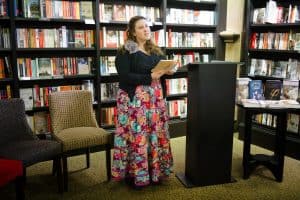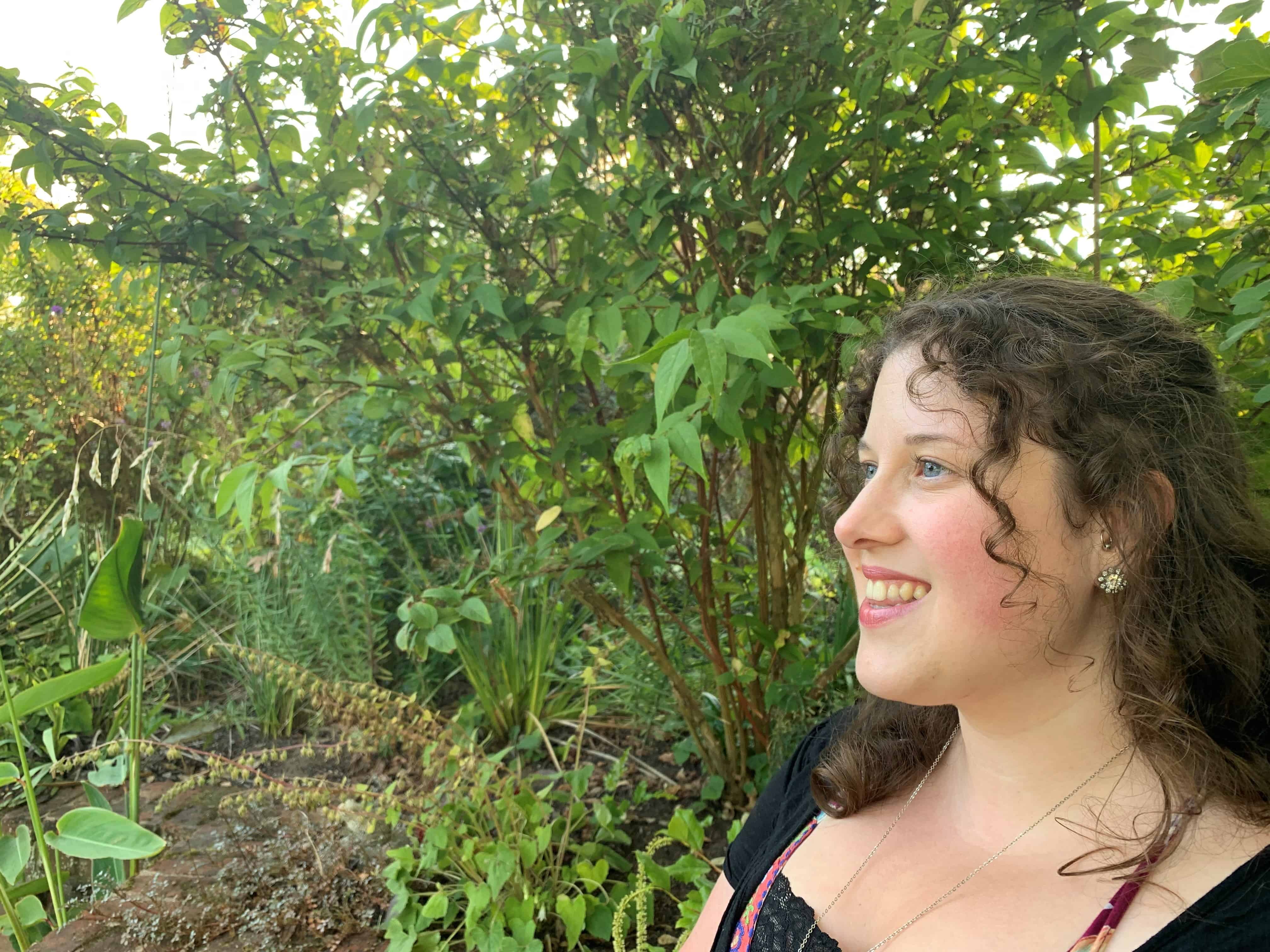By Stephen Rudd
Jo Brandon is an acclaimed poet, based in the UK. Presently the Poetry Editor for Valley Press, she has had a couple of full-length poetry collections of her own published, along with a poetry pamphlet. Here, in an exclusive interview with Pulse author Steve Rudd, Jo chats about her experience of studying a Creative Writing degree, the many different things that inspire her writing, and the best ways to physically and psychologically prepare for poetry performances…

Credit: Marcos Avlonitis
Hi Jo, how are things?
Things are great, thanks, Steve – it’s lovely to catch up with you! I’ve recently come back from a residency with Wild Plum Arts at Red House in Suffolk (former home of composer Benjamin Britten), which I spent writing songs with a very talented composer friend of mine, Ella Jarman-Pinto. We had a BBC Radio 3 commission earlier in the year to write a libretto in celebration of International Women’s Day, and it reminded us how much we love collaborating together.
How and why did you first start writing poetry?
I remember watching the news when I was nine years old, and all these very grown-up things were happening that I didn’t fully understand, but I understood enough to be unsettled and curious. That night, I wrote my first poem (with the grand title of ‘Life’!). Poetry was a way of helping me digest and process the world around me. My parents and my primary school were really encouraging; I remember they invited me to read my poem at the whole-school assembly, and I loved it. Writing and sharing poems seemed a magical way of communicating.
In terms of publication, I joined a writer’s group when I was fifteen, and getting that constructive criticism from other writers was so important. I was really lucky that the local newspaper indulged me, too, and printed a few of my poems. From then on, I just kept reading as much poetry as I could find, going to readings, researching magazines, and I did my degree in Creative Writing at Bretton Hall.
How did studying for your degree influence the way that you develop your ideas into coherent pieces of work?
My degree was so important in developing me as a writer. I had amazing tutors there, particularly Harriet Tarlo and Adam Strickson. Until that point, I had this funny idea that a poem should arrive as a fully formed thing that could go out into the world, which, of course, didn’t make for very well-crafted poems. I’ve really grown to love editing. When I’m excited about a new poem, there is still the impulse to share it too soon, but I put them away for a bit now and make sure they have a good couple of edits before I submit them anywhere.
My degree also exposed me to lots of exciting writers I would never have found on my own. It taught me the discipline of seeking inspiration rather than waiting for it; it taught me to think about themes and ideas that are important to me; and it taught me that you need a flexibility to your writing, and that you need to take risks. I’m definitely part of the ‘if something is worth doing, it’s worth doing badly’ school of thought.
Would you say that Creative Writing (as a subject) can be ‘taught’ to those who, for whatever reason, feel incapable of writing?
I think you can definitely provide all the writing tools… the rest is putting in the hours writing, reading and sharing your work. You can’t teach the impulse or the compulsion to write, but if you’re thinking about writing enough that you’re worried you can’t do it, then I think you just need to give it a go and see where it takes you. No time spent writing is ever wasted.
The poems in your Phobia pamphlet (published in 2012) touch on themes of ‘fear and hope, vulnerability and strength, nature and industry’. Did you, in the process of writing such poems, initially set out with the intention of incorporating precisely those themes, or did those themes assert their presence organically?
A bit of both really. I wrote a few of the poems and noticed there were some shared themes and preoccupations, so then I challenged myself to write specifically about phobias and fear. In one way or another, they are still themes I explore often in my work.
I find it really useful to establish themes in my collections early on, because it gives me a focus for the collection. I enjoy writing that way too… having things to research and dwell on, so that even when I’m not writing, my mind is still immersed.
As with your two subsequent poetry collections, Phobia was published by Valley Press. How did your ‘relationship’ with Valley Press come about, and did you approach any other publishers with your work beforehand?
I was so lucky with Valley Press! I had started submitting my pamphlet to publishers in 2010, and had some great feedback, but they encouraged me to build up more of a publishing track record, so I carried on working away at that. In 2011, Jamie got in touch out of the blue, having seen my profile and examples of my poetry online. At that point, VP was a very new publisher, and Jamie was specifically looking for emerging poets in the north. Once we met, and I saw his enthusiasm, passion, and the quality of what he was producing, that was it. Jamie is an incredibly supportive editor and friend, and the Valley Press community is lovely!
The Learned Goose, your first full-length collection of poetry, found literal purchase in 2015. Did you find that your brainstorming, writing and / or redrafting methods had altered at all in the wake of having received so much praise for Phobia?
I like to think I’m learning a little bit more each year and trying new things creatively, and I did feel there was a shift in my writing in The Learned Goose. I think there is a strand that runs through all my books, but there is normally something particular to each one, too. With The Learned Goose, I experimented with longer line lengths, and some of the poems are edging towards prose poems.
In terms of brainstorming, I was living in London while writing Goose, and had access to lots of museums, galleries, historic properties, exhibitions and lectures (coupled with a lot more free time!), and I think all those factors meant that I could really flood myself with ideas. I also took some amazing courses at the Poetry School, which helped me improve my editing, and revaluate my creative process.
Cures, your second full-length collection, came out at the start of 2021. In what ways (if any) were your writing process and the book’s publication impacted by the Covid pandemic?
There is a poem, ‘week 10’, that is about my lockdown experience, but there were so many tumultuous events during the period I was writing the collection: #metoo, the political landscape in the UK and US, and environmental concerns. There were also big changes to my life on a personal level, as I became a mother, entered my thirties, and moved back to Yorkshire. So I am definitely aware that the poems in Cures were a way of processing and exploring those events – sometimes through almost-biographic poems, and sometimes through history-inspired monologues.
I think the collection was most affected by the pandemic in terms of how I shared the poems. I haven’t performed them as often as I have my earlier poems, and when I have, a large majority of events have been online, which has meant adapting and learning a new skill set in terms of reading and presentation.
Generally-speaking, how much work do you do in your head before committing words to a new document? How would you describe your writing process from the point at which you mentally perceive the initial stirrings of an idea for a poem?
It varies poem to poem. Also, my creativity and productivity fluctuate wildly! Sometimes a poem arrives largely-formed, and I’m running around reciting lines while trying to find a pen; other times I have to scratch around a bit and see what comes a word at a time.
I generally put a first draft down on my computer, and then have a read through and tinker with it. Then I leave it for a few hours, have another look, and then try to leave it for a few days and give it a more rigorous edit. I read out loud as I edit. Then I try to leave it alone for a week or more, then do another edit, and then I will think about where to submit it.
Having recently become Poetry Editor at Valley Press, would you say that editing other people’s poetry helps you to reappraise your own work with a greater degree of focus?
I’ve definitely become a more rigorous self-editor, and I’ve learnt a lot from the poetry I’ve edited. So many wonderful collections! Also, when I’m having my work edited now, I think a bit more about how open I am to the experience. I’ve worked with so many poets where we’ve built a great rapport and trust, so I reflect on that when it’s my turn to receive an edit, and I’ve learnt that the more precious or defensive I am about an element of my poetry, the more I probably need to scrutinise it and see if it holds up.
Do it find it easy to transition from being creative (when you’re writing) to being analytical (when you’re editing)? Do you have any particular techniques to help you transition between such oppositional head-states?
I need to have my editor head (for editing other people’s work) on, or my writing head on, so I work exclusively on different things on different days. Editing takes a lot of creative energy, and writing requires structure and discipline, so there is a lot of overlap. Editing my own work has seeped more into my writing process so that there is a fluidity between the two. I would find it difficult to write and not edit to some degree as I go.
Put simply, what elements do you think make for a really great poem? Further, do you have a favourite poet, or poem, and if so, why?
This is difficult! Sometimes a poem just makes you sigh with a perfection between subject matter and form, or a turn of phrase, or the sheer surprise of being confronted with something you have never seen framed in poetry before. I love it when I get to enjoy all the results of well-applied form and technique but aren’t conscious of them. I love it when the universal is captured in tiny, specific details.
I can’t pick one favourite poem or poet, so I shall be a little slippery and instead tell you about the first poem I really loved, and the most recent poet that has me spellbound.
I studied Simon Armitage at GCSE, and we studied his poem ‘About His Person’, and that poem felt like a door I wanted to open. The reader learns so much about the subject of the poem, and yet there is so much more we want to ask. The use of half and full rhyme; the quirkiness of the details; the sadness of the subject matter juxtaposed with the rhythm of the poem. It is such a layered poem, but accessible, too. Magical.
The poet that I’m currently spellbound by is Joelle Taylor. I’ve admired Joelle for years, and recently I’ve been lucky enough to see her perform twice from her new book, C+nto: & Othered Poems. She is an absolutely incredible performer and crafter of words who writes about things of critical importance.
What would you say makes for a great performance when it comes to performing your own poetry? Do you have any specific tips for fully embodying ‘characters’ by way of voice projection, for example?
To improve as a writer, you need to be a wide reader. I think to improve as a performer, you need to attend lots of events: open mics, festivals, writer’s groups and workshops. I think you also need to find what works for you. Give yourself room to experiment; rehearse in front of the mirror; record yourself. But don’t put pressure on yourself to be a particular way.
Basic things would be to warm up your voice before reading, have a bit of honey and lemon before you go out, and learn to project your voice and how to read with and without a microphone. Because reading out loud is so much a part of my writing and editing, I find my more monologue-based pieces find their own voice, but I do think about words that are pleasing to say, and if I repeatedly stumble over something, that’s a warning sign. I find that using dialect words and archaic phrases are great ways to establish a ‘voice’ in performance.
I have found that the more poetry I’ve published, and the longer the sets, the less I am able to fully memorise all my poems, so I prepare for each event differently, and I think about the physicality and practicality of holding a book or paper versus knowing something by heart.
Are you working on any fresh material at present? If so, have you noticed any specific themes and / or potential titles already emerging?
I am working on a new collection called The Unplanned Kitchen, which explores domestic spaces, but also technological change, the changing nature of identity, and home. It is still in the early stages, but it was first inspired by an image by Bill Brandt called ‘The Unplanned Kitchen’ that I saw exhibited at the Hepworth in Wakefield.
For more information about Jo and her writing, visit…
https://www.valleypressuk.com/author/31/jo_brandon
www.jobrandon.com


